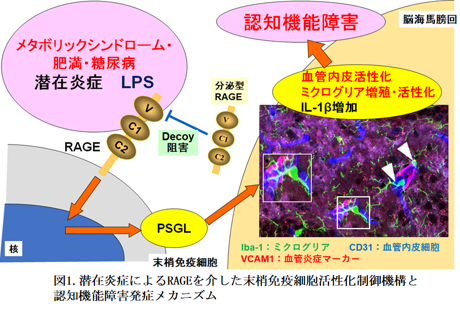Analysis of pathophysiological functions of RAGE using genetically engineered models and adenovirus expression
情報更新日 2025年12月26日
- Seeds Information
- Researcher Information
- What do you expect from collaboration with companies?
- Contact for this research
Seeds Information
keyword
潜在炎症、末梢免疫細胞、認知機能障害、RAGE
Field
Research into the onset and prevention of cognitive impairment in lifestyle-related diseases and diabetes
Overview
血管内皮細胞を舞台に、終末糖化産物受容体 (RAGE)およびその切断による炎症シグナルの関連とそのメカニズムを明らかにした(Miyoshi A et al. FASEB J 33: 3575-3589, 2019)。
近年、肥満、糖尿病による認知機能障害の病態に免疫細胞や脳内炎症、脳血管炎症が関与することが報告されている。
我々は、これらの疾患背景にある潜在炎症を表現型とした少量LPS持続投与モデルを用い、RAGEを介した末梢免疫細胞の活性化制御機構が、脳内・脳血管炎症、認知機能障害を規定することを見出した(Ye D, Miyoshi A et al. Brain, Behavior, and Immunity 116; 329-348, 2024・図1)。
本研究課題では、上記の結果をもとに、より生理的な代謝異常モデルである高脂肪食負荷モデルを採用し、下記の各種遺伝子組換えマウス、キメラマウスを用いて、脳内炎症、認知機能障害の機序について検討している。
メタボリックシンドロームにおける腸-末梢免疫細胞-血管内皮-microgliaにおけるRAGE発現の意義と、その制御への知見を得ることを目指す。
・ 血管内皮特異的ヒトRAGE過剰発現マウス → 血管内皮におけるRAGEの病態生理学的意義を検討可能
・ RAGE欠損マウス → RAGE欠損が及ぼす全身の影響を検討可能
・ キメラマウス:RAGE欠損マウスの骨髄をCD45.1マウスに移植 → 免疫細胞におけるRAGE欠損が及ぼす影響を検討可能
・ microglia、血管内皮特異的RAGE欠損マウス → microglia及び血管内皮におけるRAGEの病態生理学的意義を検討可能。
What's new?
Clarification of the relationship and mechanism of inflammatory signaling caused by the cleavage of the receptor for advanced glycation end products (RAGE) in vascular endothelial cells
What are its advantages over other studies?
We have conducted clinical and basic research focusing on RAGE and have acquired the necessary know-how and tools.
- Adenovirus-mediated overexpression of human RAGE and esRAGE (in vitro, in vivo)
- RAGE-deficient mice are useful for verifying the in vivo action of RAGE, chimeric mice using bone marrow transplantation, Alzheimer's disease model mice, and specific RAGE-deficient mice using the Cre-loxp system.
What problem does it help solve?
Cognitive impairment due to obesity and diabetes is an issue that needs to be resolved and is attracting attention. If this study reveals the involvement of RAGE in peripheral immune cells, as well as inflammation in the brain and cerebrovascular system, subclinical inflammation, and cognitive impairment, it is expected that this will lead to the resolution of the above issues.
Possibility of other applications and developments
―
Related Patents
―
Related papers
- Shoji T, Koyama H et al. Diabetes 55:2245-2255, 2006
- Koyama H, Shoji T et al. Arterioscler Thromb Vasc Biol 1: 147-153, 2007
- Monden M, Shoji T, Koyama H et al. Diabetes 62:478-489, 2013
- Miyoshi A, Shoji T, Koyama H et al. FASEB J 33: 3575-3589, 2019
- Ye D, Miyoshi A, Shoji T, Koyama H et al. Brain, Behavior, and Immunity 116; 329-348, 2024
Researcher Information
| full name | Hidenori Koyama |
|---|---|
| Affiliation | School of Medicine Department of Diabetes Endocrinology and Clinical Immunology |
| Specialization | Research into the onset and prevention of cognitive impairment in lifestyle-related diseases and diabetes |
| Collaborative Researcher | Akio Miyoshi |
| Related links | Laboratory website |
What do you expect from collaboration with companies?
We are currently elucidating the function of RAGE in vascular endothelium and immune cells.
We hope to collaborate with companies in joint research that will lead to the diagnosis, prevention, and treatment of cognitive impairment.
Contact for this research
兵庫医科大学 大学事務部 研究推進課
E-mail: chizai@hyo-med.ac.jp
Tel: 0798-45-6488

 Research Seeds Collection
Research Seeds Collection
